If you’ve been getting your daily dose of outdoor time or even just opened your windows to let in some fresh air, you’ve probably thrilled to the sound of birds singing and the smell of buds opening. Does it seem a little extra this year? It’s not just your sensory deprivation combined with the onset of spring. All across the world, people are noticing that the natural world is sort of rebooting itself. Skies are blue and unpolluted over Los Angeles, New Delhi, and other cities infamous for their smog. The brackish water of Venice’s canals is now crystal clear. Where I live in the Keweenaw Peninsula, which is already largely ruled by nature, white-tail deer are cantering down the middle of empty roads.
If you look at the situation through a hippy-dippy kaleidoscope, you could say Mother Earth gave herself a present for her special day by locking her pesky human children indoors and enjoying a little “me time.” It’s hard to begrudge her that, considering how much damage people have done to the planet. But how are you and I supposed to celebrate Earth Day while sheltering in place?
One way you can do it is by giving yourself an environmentally-friendly home makeover. Spending all this time in your house has probably alerted you to the sorry state of your decor. It’s truly shocking how single or childless adults of means and education neglect their domestic interiors. We’re talking threadbare bedsheets and towels, furniture propped up with cinder blocks and held together with duct tape, sagging mattresses. No wonder you never invite your mom over.
If you’ve realized it’s time for your apartment to grow up, take this opportunity to invest in earth-friendly home goods. New studies are revealing that the home goods industry is a major culprit in greenhouse gas emissions — in fact, manufacturing the average piece of furniture produces the same amount of CO2 emissions as burning 5 gallons of gas.
The solution isn’t complicated. By choosing sustainably produced furniture that uses recycled materials and/or manufacturing processes with a low environmental impact, consumers like you and me can significantly reduce the toxic load we’re adding to the environment.
However, just buying home goods labeled “green” or “eco-friendly” isn’t the whole story. It’s not just the manufacture of furniture and textiles that contributes to climate change, it’s also what happens when your old stuff gets thrown out. The home goods industry is a major player in disposability culture, as more and more cheap goods are produced to satisfy trends, only to get tossed in favor of the next year’s fashion. This leads to landfill overflow (over 9 million tons of furniture and 13 million tons of textiles) and poisons soil and groundwater as manufacturing chemicals leach from these items into the ground.
That’s why, when you’re looking for new furniture or other home goods, it’s important to seek out brands that feature products with a long lifespan. High-quality, thoughtfully designed home goods made from sustainably sourced materials will not only save you money over time but help preserve the integrity of our planet.
If we can’t be outside for Earth Month, the next best thing is honoring our beautiful planet by changing our choices in favor of its health. Think of it as Home Makeover: Earth Day Edition. To help you celebrate, we curated a roundup of our favorite brands in environmentally sustainable home design, furnishing, and textiles so you can get acquainted with all the great options out there for building a beautiful, sustainable home environment. We also spoke with a number of these brands to hear about how they’re making a game-changing impact on behalf of our planet.
Floyd Home
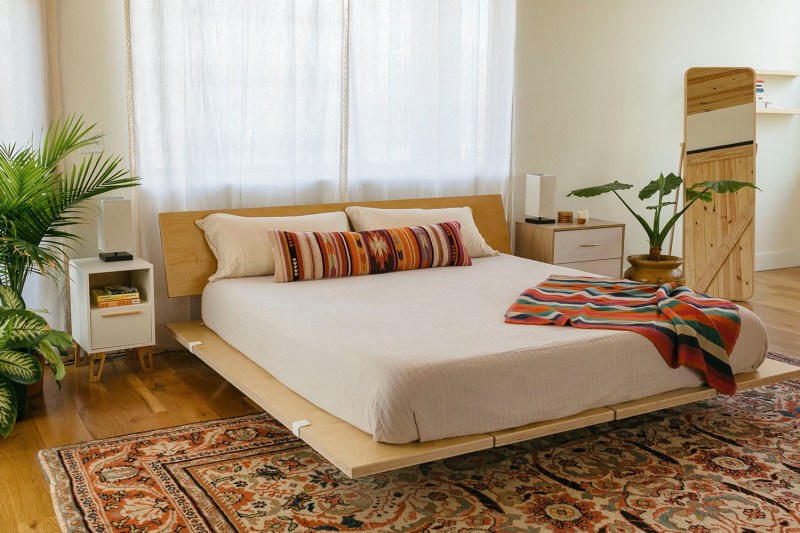
The modular furniture brand is best known as one to the flagship startups that revived Detroit into a maker economy. However, the brand was actually launched in direct response to the number of sofas, bed frames, and bookcases that end up in landfills every year. With the aim of improving the way people consume, keep, and enjoy their furniture, Floyd launched its series of heirloom-quality furniture that is thoughtfully designed for ease of transport and assembly — in other words, the perfect furniture for the increasingly mobile millennial lifestyle.
The Stats
Floyd’s whole deal is furniture designed for keeping. Along with its timeless aesthetic and beautiful materials, Floyd furniture is beloved among fans for its clever modular design. Along with being easy to assemble, disassemble, and transport from one home to another, this modular design allows your furniture to flex according to your changing space and needs. By making sofas, beds, and tables that can be expanded, and offering spare parts a la carte on the occasion that something needs repair, the brand ensures that your Floyd pieces really will last a lifetime.
Standout Sustainability Cred
Rather than constantly updating its catalog with eye-catching new designs, the Floyd team spends years perfecting the design of their products, with planned obsolescence in mind. In other words, they design each product to be not only aesthetically timeless and functional but also flexible so that it can be expanded or built upon instead of being tossed when the customer’s needs change.
Floyd products are all American-made and -manufactured. The primary source material, a beautiful blonde birchwood harvested in Floyd’s home state of Michigan, is not only beautiful and durable, but also TSCA Title VI-certified to ensure extremely low emissions.
Long-Term Goals
Floyd believes that the best way to counter disposability culture is to offer thoughtful products and service that people want to invest in. In pairing the convenience of flat-pack delivery intuitive assembly/disassembly with timeless design and U.S. manufacturing, the company aims to improve everything about how Americans keep house.
Why It Matters
“Up until a few decades ago, furniture was thought of as something you keep and even pass down to future generations. However, with the growth of a few companies, the cultural norm of how we consume furniture dramatically shifted. Inexpensive materials and the big box delivery model allowed the offering to become so cheap that you felt comfortable only committing to the product for a year or two. This was exasperated by a change of living patterns with people moving more frequently and a lack of quality design at a mid-range price point. The things we purchase and the rate at which we purchase them matter, and we take the opportunity we have to impact consumption behavior very seriously,” say Floyd co-founders Kyle Hoff and Alex O’Dell.
Our Pick
The Floyd Bed is a prime example of how the brand’s thoughtful design process supports its sustainability ethos. First launched in 2015, this modular masterpiece is not only stylish and sleek, but it’s made to adapt as your needs change. Add panels to go from a twin to a California king, attach a headboard for a more standout profile, or add the Underbed Storage kit for a boost of furniture functionality.
Feather
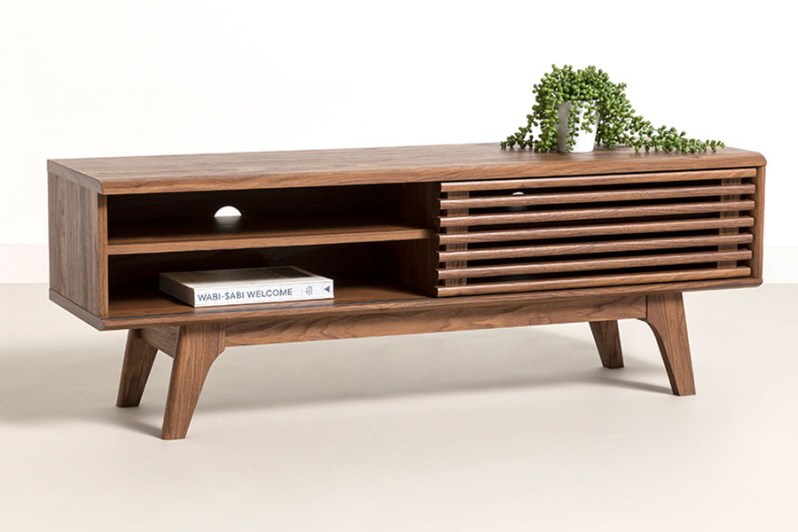
One of the biggest factors in furniture disposability is the unique mobility of the modern worker. Stats show that the average American moves between five and seven times throughout their working years. And the bulk of these moves take place during the 20s and 30s, a time when many people are still figuring out their personal decorating style. Feather was born to facilitate these changes of address and aesthetic in an environmentally sustainable way: by offering high-quality, stylish furniture and decor for people to rent before they buy.
The Stats
Feather was founded from the beginning to be a circular business — rent and reuse, instead of buy and dispose — that leveraged the modern mobile lifestyle for the good of the planet. By offering customers the option of renting and returning once their needs or tastes change, they are enabling a significant reduction of waste in our landfills while helping people feel at home no matter where they live or how long they live there. And once a piece has reached its reusability limit, Feather donates it to a “forever home” at local shelters and nonprofit housing organizations.
Standout Sustainability Cred
As of Earth Day 2020, Feather is setting out on a major endeavor to offset the carbon footprint of its domestic operations. After a rigorous assessment across their HQ operations, supply chain, and customer deliveries, Feather is set to eliminate 2,500 tons of CO2 per year. Moreover, Feather is pledging these carbon offsets to aid reforestation and sustainable timber harvesting projects in the region that produces the wood found in many of their products.
Long-Term Goals
According to founder/CEO Jay Reno, Feather’s mission is to transform humanity’s relationship with material goods for a healthier and happier planet. By giving new life to furniture through their rent-and-refurbish model, they offer an alternative to the compulsive buying and ownership of fast furniture.
Why It Matters
“Furniture is also the least recycled home product in the United States — it creates twice the waste of appliances each year, for example, but is 100 times less likely to be recycled. We need to not only reduce the impact of fast furniture by giving customers quality, flexible, affordable alternative, but we need to open up the dialogue around how furniture fits into an overall sustainable lifestyle,” says Feather founder and CEO Jay Reno.
Our Pick
If forced to pick just one favorite from Feather’s catalog, we’re going with this walnut console. The low-slung profile, tapered legs, and asymmetrical shelving make this piece ultra-mod and stylishly nostalgic all at once. Thank goodness they have a rent-to-own option.
Avocado Mattress
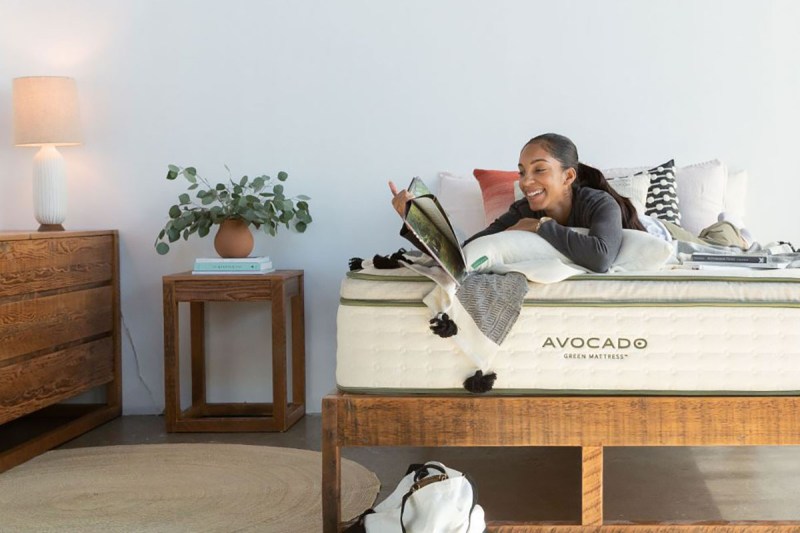
In the words of company cofounder Mark Abrials, Avocado was “created out of a need to do better.” Along with being the most respected source for organic bedding, and upholding environmentally and ethically conscious business practices, Avocado is proactive in having a positive global impact, using their success to build a world united by sustainability and social responsibility.
The Stats
Where do we begin? Along with hand-building mattresses in the Untied States from GOLS-certified materials (Global Organic Latex Standard; wool, cotton, and latex sustainably harvested from rubber trees) that are easily biodegradable or recyclable, Avocado seeks out third-party certifications for every purity claim they make. Their products are Greenguard Gold Certified for meeting the world’s most rigorous emissions standards for chemical exposure and pollutants.
In addition, Avocado maintains a dedicated “Sustainability and Evolution” team that has developed a nationwide network of over 1,000 nonprofit partners to keep returned mattresses out of landfills, and instead supply them to homeless shelters, women’s shelters, rehabilitation, and refugee centers.
Standout Sustainability Cred
In 2019, Avocado also became the world’s first mattress company to achieve net-zero carbon emissions across the entirety of its operations, an achievement that they countered with a pledge to be carbon negative in 2020.
Long-Term Goals
Avocado is committed to being a global leader in sustainable and ethical business. From reducing their carbon footprint through localized distribution centers to taking their delivery service in-house, their goal is to offer both products and service that give the sustainable home goods industry a good name.
Why It Matters
“How we live and how we shop has a direct impact on our environment. Even small changes add up to progress — every purchase we make is an opportunity to vote for the change we want to see. Now, more than ever with the spread of COVID-19, our homes have become our place of refuge. Creating a space that is healthy, non-toxic, and sustainable isn’t just important for our planet — it’s important for our families. We encourage conscious consumerism at all levels and believe in buying fewer things that are truly built to last,” says Avocado cofounder Mark Abrials
Our Pick
The sustainable credibility of the Avocado mattress makes it an obvious pick. So to keep things interesting, we’re highlighting the Eco Dresser. Built from 100%reclaimed wood, it combines everything we love about minimalism and rustic charm into one simple, solid piece.
Coyuchi
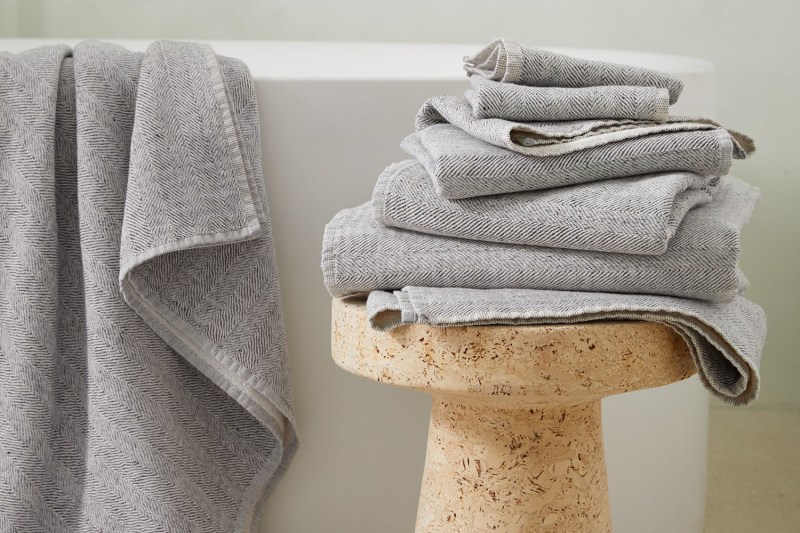
In 1991, a little shop opened in a little town in California’s Central Coast, offering home textiles spun from organic cotton. Organic cotton had just begun to show up in the apparel industry — nobody else was doing it for towels and sheets. In the decades since, Coyuchi has continued to lead the textile industry, pioneering not only clean manufacturing methods but also using their resources to create a uniquely circular supply chain and to ensure that their products stay out of landfills.
The Stats
By working exclusively with organically grown fibers and dying materials, Coyuchi ensures that none of its products will pollute the planet with chemical runoff.
Standout Sustainability Cred
Coyuchi partners with Fibershed, a program that highlights sheep ranchers who practice “carbon farming,” a set of farming practices shown to scientifically restore ecosystems and achieve quantifiable results toward climate change mitigation. As of last month, Fibershed partners have sequestered over 1,500 metric tons of greenhouse gases.
Over the last three years, Coyuchi has begun buying its own worn-out products back from customers to repair/recycle for resale or for use as part of a new product. To date, this circular business model has kept over 19,000 pounds of Coyuchi material out of landfills and saved millions in carbon emissions as well as energy and water use.
Long-Term Goals
Now that they’ve reached their goal of achieving full circularity with their recycled product line, Coyuchi aspires to influence the textile industry at large. As more textile brands follow sustainable practices, the global supply chain infrastructure will improve, allowing Coyuchi and others to scale more easily and better support small farmers and local workforces around the world.
Why It Matters
“Polyester, which dominates our fiber supply, is derived from petroleum, and microplastics in our air and in our water have a very clear individual impact. If we can impart one thing, it’s the importance of natural fibers, and the far-reaching benefits they have for restoring systems, building soil environments, supporting small-holder farmers who are the bedrock of our food system, and they provide really high-quality safe textiles that can last a lifetime. Organic cotton is such an important crop. It’s better for humanity, for our environment, for the ecosystem at large,” says Coyuchi marketing vice president Sejal Solanki and production and ustainbility manager Margot Lyons
Our Pick
Sinfully soft and shockingly absorbent, Coyuchi’s Catalina towels are made from a blend of organic cotton and linen and feature a luxurious drape that you’ll want to spend all day in.
Jungmaven
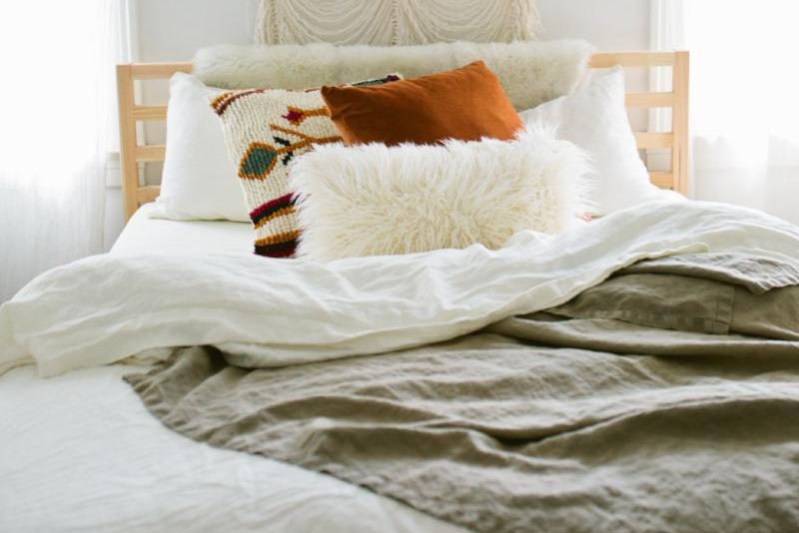
While this company is best known for its cosmically cool tees and shorts made from organic hemp, its small collection of bedroom textiles deserves just as much recognition. Launched in 2005 by a former deforestation activist, Jungmaven’s laid-back vibe belies its vigorous effort to spread the CO2-mitigating gospel of hemp agriculture. Believing that the principle “health is wealth” applies just as much to the earth and the economy it fuels, Jungmaven is also a stickler for environmental sustainability in every step of its supply chain, from production and dying to packing and shipping.
The Stats
Jungmaven’s founding mission was to persuade the U.S. government to legalize industrial hemp. Along with lobbying Congress, the brand focused on winning hearts and minds by offering dreamy-soft apparel and home goods made from hemp produced outside the States. But once the 2018 Farm Bill was signed, the brand went no-holds-barred in its HEMP 2020 campaign to popularize regenerative farming by getting everyone in a hemp T-shirt by this year. (With reps like Brad Pitt and Leonardo DiCaprio, we’d say they’re well on their way.)
In addition, Jungmaven has partnered with many different environmental health initiatives over the years, donating portions of their sales to organizations like the Mojave Desert Land Trust, the Changing Tides Foundation, and the Rainforest Alliance.
Standout Sustainability Cred
Along with championing regenerative agriculture through their near-exclusive use of industrial hemp, Jungmaven is committed to expanding its use of natural dyes. And since they know that it feels better to pass unwanted household goods on to someone who needs it, rather than just throw it away, the company uses Craigslist and social media to either sell or give away product that is no longer needed.
Long-Term Goals
Along with creating exceptionally sustainable hemp products that inspire and empower others to help the planet, Jungmaven is developing ways to influence the entire economy toward a more environmentally sustainable model. They actively promote the use of regenerative hemp in other industries, such as food, medicine, building supplies, even oils, and plastics.
Why It Matters
“Asking ourselves how our actions today will affect our children’s children is the most important cultural shift in our lifetime. Every day, we spend hundreds if not thousands of dollars investing and voting for what we want our world to look like. But it’s the everyday purchases like food, electricity, clothing, etc. There is no better time than now to evaluate how these products impact our health, and what types of materials we should be utilizing to drive healthier lifestyles,” says Jungmaven founder Robert Jungmann
Our Pick
Cloud soft and blissfully breathable, with just a hint of nubby texture for warmth on cool nights, Jungmaven’s hemp bedding is tailor-made for mornings that last all afternoon.


